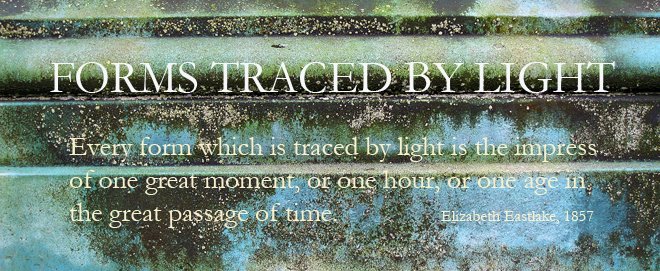 Quite wonderfully, around three o'clock this afternoon, there was a shuffling outside the door of my office, and in came all the staff - all bar Cheryl, who was tied up with a visitor - bearing a just very slightly belated birthday cake (I didn't announce my natal day yesterday, but various people in the know from FB came by to wish me a Happy B, and the secret had escaped) - with my name piped in turquoise icing on the chocolate covering. And cards. And singing Happy Birthday. And asking me if we sing "Happy Birthday" in England - which of course we do, and it had never struck me to think we mightn't. Interestingly, though (meaning I didn't know this till I looked it up on Wikipedia), the melody is is an American one, written - or at least borrowed - by schoolteachers Patty and Mildred J. Hill in Louisville, KT in 1893 for the words "Good Morning to All," and their students - apparently - liked it so much that they changed the words when they then started to sing it at birthday parties. It appeared in Children's Praise and Worship in 1918, and Coleman's American Hymnal in 1933 (surely a bit lightweight for a hymn?). But when was it imported into England? I couldn't find anything that said: I must ask my parents (both born in 1923) if they remember singing it in their childhoods.
Quite wonderfully, around three o'clock this afternoon, there was a shuffling outside the door of my office, and in came all the staff - all bar Cheryl, who was tied up with a visitor - bearing a just very slightly belated birthday cake (I didn't announce my natal day yesterday, but various people in the know from FB came by to wish me a Happy B, and the secret had escaped) - with my name piped in turquoise icing on the chocolate covering. And cards. And singing Happy Birthday. And asking me if we sing "Happy Birthday" in England - which of course we do, and it had never struck me to think we mightn't. Interestingly, though (meaning I didn't know this till I looked it up on Wikipedia), the melody is is an American one, written - or at least borrowed - by schoolteachers Patty and Mildred J. Hill in Louisville, KT in 1893 for the words "Good Morning to All," and their students - apparently - liked it so much that they changed the words when they then started to sing it at birthday parties. It appeared in Children's Praise and Worship in 1918, and Coleman's American Hymnal in 1933 (surely a bit lightweight for a hymn?). But when was it imported into England? I couldn't find anything that said: I must ask my parents (both born in 1923) if they remember singing it in their childhoods.The cake was, in a sense, generic - but I'm also starting to think about the genre in which I write about it, about "Happy Birthday," about ordinariness, or the extraordinary within the ordinary - in part prompted by the present to myself that Amazon delivered today, David Shields' Reality Hunger: A Manifesto (I'd forgotten I'd pre-ordered it was back in November - it was another good surprise of the day). 618 paragraphs, or sentences, or bits, arranged - yes! - under alphabetical headings: meditative, aphoristic - just about my favorite experimental style: think Benjamin (and yes, Shields' appendix does, indeed, lay bear the underlying tissue of quotations embedded in the loosely connected structure) meets Georges Perec. He's posing the question of what constitutes an appropriate literary form for the C21st century; keeps (but bear in mind I've only given it the most cursory skimming: I can't wait to read it properly) coming back to the advantages of the lyric essay. He considers Facebook and MySpace's utility as "crude personal essay machines" - he's thinking especially about the informational pages, the instant status updates. "Every page is a bent version of reality - too unsophisticated to be art but too self-conscious to be mere reportage. In this new landscape, everyone gets a channel. It seems to be the ultimate destiny of every medium to be dragged down to the lowest common denominator, which is at once democratic, liberating, exhilarating, bland, deafening, and confusing. User-made content is the new folk art" (p.94). Folk art? Is this the connection between my blog and "Happy Birthday," perhaps?


Blogs as folk art -- Freaking brilliant! My typist was working on something along those lines just today, musing on the strangely quaint, homemade quality that blogs have. She was comparing them to Dickinson's handmade books of poetry -- Does that strike you as too grand (or self-aggrandizing) a comparison?
ReplyDelete"...a gift from me to you, a folk cure, a hand held out. I look into my heart and see a whore there, but I also see something else" (section 91).
ReplyDeletePerhaps this new 'folk cure' is commensurate with the struggles of a generation of attention-deficit composers whose queer use of the ventrolateral prefrontal cortex provides a viable (although increasingly less so, if the nay-sayers have anything to say about it) opportunity for communication and cognitive training that's been hitherto obstructed? Shields seems to be suggesting that this is the case...
"Folk cure" as "evolution"? Check out this NYT article (which absolutely deserves more than a cursory glance): http://www.nytimes.com/2010/02/28/magazine/28depression-t.html?pagewanted=1&sudsredirect=true
This would, I think, give credence to your latest allusion to the Oulipo group's aesthetics of untempered thematic expression governed by an exceptionally rigid structural formula...
ReplyDeleteFinally... how does this speak to your recent assertion (in both your article on "the hour of pink twilight" and your MLA presentation) of the queerly redemptive qualities of the 'open text' (the short story, the fragment, et al)? Is it possible that this 'openness' contributes to the process by which 'Passed' “collapses the body of narrator and prostitute, and seems to merge both into the corrupt, conscience-less, urban body politic that each helps to form" (702)?
ReplyDeleteP.S. See Sam See's "Queer Natures" project (re: VPFC)
ReplyDelete